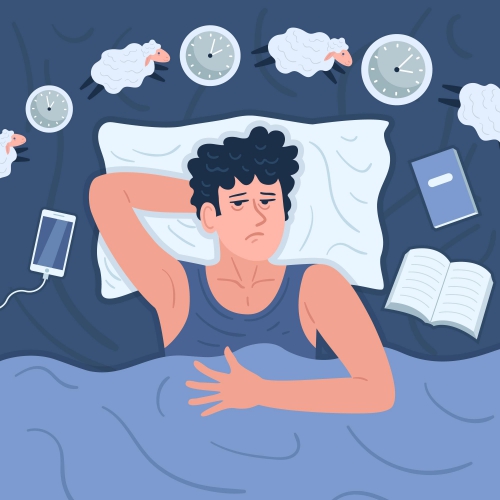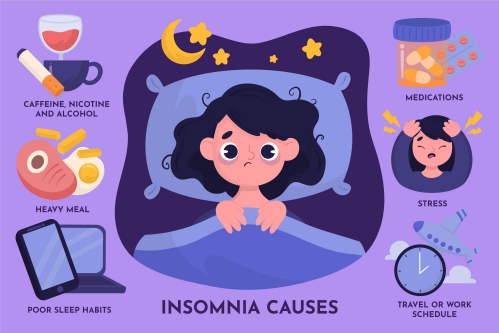Insomnia, Sleep disorders, Psychological disorders, Sleep hygiene
Description : Insomnia is a condition in which a person has trouble sleeping, including difficulty falling asleep
Article Details :
What is Insomnia?
Insomnia is a condition in which a person has trouble sleeping, including difficulty falling asleep and maintaining the sleep. If you have insomnia, you may also have difficulty waking up early in the morning. The condition also causes impairment in the activities of daily living as you may also experience impairing symptoms during daytime such as fatigue, sleepiness, impaired attention and mood disturbance.
Insomnia is a very common complaint for which people go to see a doctor. It may occur before or along with other medical or psychiatric disorders. It can also occur as a response to psychological or physical stressors. Normally, most adults need around 7 hours of sleep for proper functioning. Insomnia is a condition that is more common in older adults and women. It is also more prevalent among those who are unemployed, having marital issues, widowed and those who are of lower socioeconomic status.
With the help of lifestyle changes and habits, most people can find relief from the condition. In some cases, medications may even be used.
What causes insomnia?
Insomnia may be caused by physiological and psychological stressors. It may occur as a condition on its own or associated with other conditions. Your lifestyle may also have an important impact on the quality of your sleep. Causes of insomnia include the following:
- Stressors: Problems at work, school, finances or in the family can all trigger insomnia. This is because your mind keeps thinking about all these issues all through the night making it difficult for you to fall asleep. Other stressful life events such as the death of a close relative or a trauma can also result in insomnia.
- Poor sleep hygiene: Use of screens such as mobile phones, laptops, computers or television before bed can affect your sleep. Going to bed at irregular time every day, having daytime naps and sleeping in an uncomfortable environment can cause insomnia.
- Travelling and change in time zones: This can disturb your body’s sleeping rhythm known as the circadian rhythm. This is what normally control your sleeping and waking cycle.
- Eating a heavy meal in the evening: This can result in an uncomfortable feeling when you are trying to sleep.
- Medications: Certain medications may cause insomnia as a side effect. These include some antihypertensive drugs, antidepressants or pain relief medications that contain stimulants.
- Other medical conditions: Some medical conditions may be associated with insomnia. These include anxiety disorders, post-traumatic stress disorder, depression, chronic pain, diabetes or heart diseases amongst others.
- Stimulants: Stimulants such as coffee, tea, soft drinks, nicotine, alcohol and energy drinks can prevent you from falling asleep at night.
What are the risk factors for insomnia?
The following factors may increase your risk of having insomnia:
- Being over 60 years old
- Being a woman
- Suffering from another chronic condition
- Having a mental health disorder
- Unable to manage stress
- Being exposed to stressful events
- Having a poor sleep hygiene
What are the symptoms of insomnia?
Insomnia can present as a condition on its own or as part of another disease. It can manifest with the following symptoms:
- Poor quality of sleep
- Not being able to maintain a good sleep
- Difficulty to fall asleep
- Waking up too early
Furthermore, the lack of proper sleep can give rise to other impairing symptoms during the day including:
- Fatigue and weakness
- Impaired attention
- Poor concentration
- Social dysfunction
- Irritable mood
- Feeling sleepy during the day
- Lack of motivation to perform daily tasks
- Higher risk of having accidents or making errors at work or school
- Impulsivity
- Aggressiveness
- Anxiety
Making a diagnosis
The diagnosis of insomnia is usually made by taking a thorough clinical history followed by a complete physical examination to rule out any other possible medical conditions. Blood tests are not usually required, however they may be requested to rule out any other coexisting medical conditions.
A sleep diary may also be helpful to make the diagnosis of insomnia. This includes a detailed de ion of the sleep problem including the number of times you awaken, the duration of awakenings and since when you are having the problem. It also included your sleeping time, the duration until onset of sleep, the final time you awaken as well as times and lengths of your naps. Furthermore, it also included the other symptoms you experience during the day. All of the mentioned information above are recorded in a diary for about one or two weeks.
A sleep study, on the other hand, is a procedure which requires you to spend the night at a sleeping centre. Tests will be done recording the activities of your brain, breathing pattern, heartbeat, ocular movements and other movements in your body.




